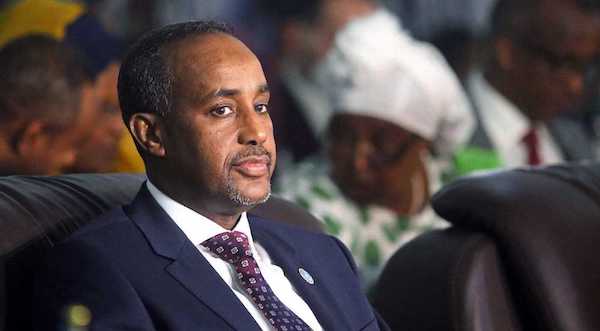
The file photo shows Somalia’s Prime Minister Mohamed Hussein Roble at an election negotiation session in Mogadishu. (Photo by Reuters)
Somalia’s premier has denounced a decision by the country’s Western-backed president to suspend him over allegations of corruption and misuse of public land, describing the move as "a blatant coup attempt."
"The president decided to suspend Prime Minister Mohamed Hussein Roble and stop his powers since he was linked with corruption," the office of President Mohamed Abdullahi Mohamed announced in a statement on Monday, while accusing the premier of obstructing a probe into a land grabbing case.
#Somali Prime Minister Mohamed Hussein says his cabinet is responsible for leading the country; orders security commanders to take orders from him and not President Farmaajo. Roble warns any security chief who fail to report to him will be dealt with in accordance with the law. pic.twitter.com/RRQJ0VE6mh
— Suleiman Koronto (@SuleimanSabdow2) December 27, 2021
It added that the marine forces commander, General Abdihamid Mohamed Dirir, was also under investigation for corruption and had been suspended.
In response, Roble blasted the move as "unconstitutional," accusing the president of attempting to carry out "a coup against the government, the constitution, and the rules of the country."
He said the aim of this "illegal" step is to derail the country’s long-awaited elections, asking the armed forces to follow his orders instead of the president.
"As the president has seemingly decided to destroy government institutions... I order all Somali national forces to work under the command of the office of the prime minister from today", Roble said at a press conference.
Monday’s development came a day after the two top officials quarreled over long-delayed elections. The latest move may further escalate political disputes in the restive Horn of Africa nation.
On Sunday, Mohamed’s office accused Roble of "posing a serious threat to the electoral process" and carrying out activities that were in violation of his mandate. Mohamed withdrew the prime minister’s mandate to organize the next polls and called for the establishment of a new committee to "correct" the shortcomings.
Roble’s accused the president of disrupting electoral processes, alleging that the president had no desire to hold "a credible election in this country."
Relations between the president, also known as Farmajo, and Roble have long remained tense, with the latest row raising new fears about Somalia’s stability as the nation strives to hold fresh parliamentary elections.
in a post on Twitter later in the day, the US embassy in Somalia urged the country’s leaders "to take immediate steps to de-escalate tensions in Mogadishu, refrain from provocative actions, and avoid violence."
Tensions in Somalia first escalated in February when the president’s term expired before elections and he extended his term by two years, drawing the wrath of opposition forces within the government as well as the country’s armed militia, which led to clashes in the streets of Mogadishu.
The constitutional crisis was only defused when the president reversed the term extension and Roble brokered a timetable to a vote.
In the months since, however, a bitter rivalry between the two men has derailed the electoral processes again, straining ties with Western allies who expect the process to finish "peacefully."
Farmajo and Roble only agreed to an apparent truce in October and issued a unified call for the election process to accelerate. Polls for the upper house have concluded in all states and voting for the lower house began in early November.
The development comes just two months after the United Nations raised serious concerns about humanitarian issues in central Somalia following the displacement of 100,000 people in fighting between pro-government and opposition militia forces.
The al-Shabab group has been fighting Somalia’s central government for more than a decade, in an attempt to establish its own rule in the African nation.
The militants frequently carry out gun and bomb attacks against both civilian and military targets, including busy traffic intersections, hotels, and military bases.
LINK: https://www.ansarpress.com/english/25299
TAGS:






























 online news tv
online news tv




